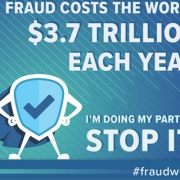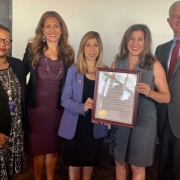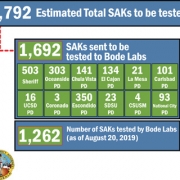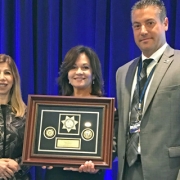This is Why You Should Report Fraud
For several years, the owners of a local hotel cleaning janitorial service company called Good Neighbor Services, with nearly 800 employees, lied to tax authorities and their insurance provider by claiming to have almost no employees. This resulted in $6.8 million in theft and became the largest workers’ compensation premium fraud case in California, when it was prosecuted by the San Diego County District Attorney’s Insurance Fraud Division in 2015. The case is just one example of the many types of fraud the San Diego County District Attorney is working to prevent and prosecute.
Insurance Fraud, for example, is the second-largest economic crime in the nation and costs California residents approximately $15 billion a year. To combat this ever-growing problem, the District Attorney, in conjunction with the California Department of Insurance, is shining a spotlight on this issue through social media during International Fraud Awareness Week, November 17-23. The goal is to minimize the impact of fraud by promoting anti-fraud awareness and education, as well as encouraging the public, employees, and businesses to report suspected fraud to authorities. For information and resources about International Fraud Awareness Week, visit www.FraudWeek.com.
“Fraud takes many shapes and forms and often leaves victims financially and emotionally devastated. That’s why our office has expert prosecutors and investigative teams who are dedicated to preventing and prosecuting this type of crime,” said District Attorney Summer Stephan. “Whether it’s elder victims being taken advantage of by unscrupulous life insurance or investment agents, sophisticated cybercrime scammers, or businesses that cheat their employees and unfairly compete by not providing workers’ compensation required by law, we are the People’s Prosecutor working hard to protect you and hold fraudsters accountable for their crimes.”
The DA’s Insurance Fraud Division is dedicated to eradicating all types of insurance fraud, whether it relates to workers’ compensation, automobile insurance, life insurance, or fraud in the healthcare industry. The Economic Crimes Division at the District Attorney’s Office is also responsible for prosecuting a wide variety of fraud, including identity theft, investment scams and embezzlements.
In 2018, the DA’s Insurance Fraud Division filed criminal charges against 405 defendants and obtained 440 convictions for various insurance fraud offenses. As a result of these convictions, over $5.6 million in restitution was ordered for victims, including individuals, insurers, and state agencies. During that same time period, the Economic Crimes Division filed charges against 481 defendants and obtained 420 convictions, which resulted in $9.5 million in restitution.
Some examples of the types of fraud the District Attorney prosecutes are:
- Workers’ Compensation Provider Fraud – When medical and legal providers, including doctors, chiropractors, and lawyers are paying or receiving kickbacks for referrals, billing for services not rendered or overbilling for services provided.
- Workers’ Compensation Premium Fraud – When a business misrepresents its true payroll, the type of work it performs, or conceals employee injuries to pay lower workers’ compensation premiums. One of the most common premium fraud schemes occurs when employers pay employees in cash without reporting that cash payroll to the Employment Development Department and their insurer. This activity results in $7 billion in lost revenue each year and evasion of approximately $6.5 million in payroll taxes annually.
- Workers’ Compensation Applicant Fraud – When employees fake or exaggerate work injuries in order to collect workers’ compensation benefits, or when employers make false statements to deny benefits to injured workers.
- Uninsured Employers – Every business in the State of California is required to have workers’ compensation insurance to cover its employees in the event of a workplace injury. These cases are especially important because if an employee is injured at work and their employer does not have workers’ compensation insurance, the employee may have no recourse to get required care and benefits.
- Auto Insurance Fraud – Fraudulently obtaining payment on an auto insurance policy based on false information such as inflated or faked damages, staged collisions, false claims of vehicle theft and arson. This fraud costs consumers billions of dollars each year in the form of higher insurance premiums.
- Disability and Healthcare Fraud – This involves fraudulent medical and disability claims and policies, including medical providers who fraudulently bill insurance companies or who divert medications for personal use or sale. Healthcare fraud increases medical costs for everyone.
- Life and Annuity Fraud – Unscrupulous life insurance agents and others who seek to steal the savings of victims through power-of-attorney abuse, securities fraud, and fraudulent claims on legitimate policies. These scams often target senior citizens and the impact is life-altering, since seniors do not have the time or opportunity for financial recovery.
- Real Estate Fraud – This involves various fraudulent real estate transactions and/or schemes such as submission of forged loan applications; fraudulent transfers of title of real property; recordation of fraudulent real estate documents; home equity sale contract fraud; and mortgage foreclosure consultant fraud.
- Computer and Technology Crimes High Tech Task Force (CATCH) – These types of crimes typically involve computer intrusions, credit card or ATM fraud committed online or crimes where technology is used to obtain someone’s personal identifying information.
- Identity Theft – These crimes usually involve criminals acquiring key pieces of someone’s identifying information to impersonate them and commit numerous forms of fraud which include taking over the victim’s financial accounts, opening new bank accounts, purchasing automobiles, applying for loans, credit cards, and social security benefits, renting apartments, and establishing services with utility and phone companies.
- Complex Theft – These cases involve embezzlement or investment scams. Embezzlement is the fraudulent appropriation of property by a person to whom it has been entrusted. Instead of using the company’s payroll system or checking or credit card account for legitimate company business, the individual uses these accounts to steal by directing the money to his or her own accounts or to pay for personal expenses. Grand theft schemes usually involve the finding a way to a person misrepresenting an investment opportunity and instead using the money to support his or her own lifestyle.
If you see, hear, or know of an insurance fraud scam happening in your area, please contact the DA’s Office through the Insurance Fraud hotline at (800) 315-7672 or at sdconnect@sdcda.org, or contact the California Department of Insurance at (800) 927-4357. To report fraud related to real estate, you can contact the DA’s Real Estate Fraud hotline at (619) 531-3552. To report any other type of fraud or criminal activity, please contact your local law enforcement agency.









